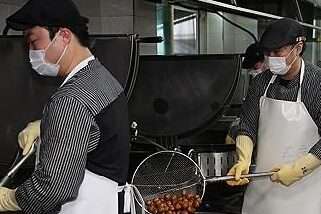Ministry of Oceans and Fisheries-Ministry of Agriculture, Food and Rural Affairs, Continuous Efforts to Stable Supply and Improve Quality of Agricultural and Marine Products for Military Meals

(provided by the Ministry of National Defense)
The Ministry of Oceans and Fisheries (Minister Kang Do-hyung, hereinafter referred to as MOF) and the Ministry of Agriculture, Food and Rural Affairs (Minister Song Mei-ryeong, hereinafter referred to as MOF) announced that the new military meal policy of the Ministry of National Defense, which will be implemented starting in 2025, reflects measures to promote the use of domestic and regional agricultural, livestock, and fishery products.
The Ministry of Oceans and Fisheries and the Ministry of Agriculture, Food and Rural Affairs have been actively participating in the “Military Meal Innovation Council (TF)” (chaired by the Vice Minister of National Defense) and have been working with the Ministry of National Defense and agricultural, livestock, and fisheries cooperatives to establish measures for the stable supply and quality improvement of agricultural, fishery, and fishery products for meals.
First, it was decided to maintain the proportion of agricultural, livestock, and fishery product contracts for procurement of military meal ingredients at 70% in 2025, the same as in 2024.
To this end, the Ministry of Oceans and Fisheries plans to establish a close cooperative system with fisheries cooperatives to ensure that local specialties can be quickly supplied to military units, and to expand the supply of customized food ingredients that can be easily cooked at military units. The Ministry of Agriculture, Food and Rural Affairs also plans to cooperate with local agricultural and livestock cooperatives, the Korea Agro-Fisheries & Food Trade Corporation (aT), etc. to simplify the contract method between multiple military supply cooperatives and units into a single cooperative-unit contract, establish a supply and demand system utilizing the public food supply platform, and expand preprocessing items.
In addition, when promoting military meals as a private sector outsourcing project, priority should be given to using domestic and regional ingredients, and a new provision was added to apply the contents of the “Special Act on Support for Border Areas” stating that “efforts should be made to give priority to purchasing agricultural, livestock, and fishery products produced in border areas.”
Hong Rae-hyung, director of fisheries policy at the Ministry of Oceans and Fisheries, said, “We were able to produce meaningful results through close cooperation between related ministries through the Military Food Service Innovation Council (TF).” He added, “We will continue to improve the supply system and develop products to continuously supply high-quality seafood that reflects the preferences of soldiers as much as possible.”
Yang Joo-pil, the director of the Ministry of Agriculture, Food and Rural Affairs’ Food Industry Policy Bureau, said, “The active collaboration between related ministries to improve military meals has borne fruit,” and added, “The Ministry of Agriculture, Food and Rural Affairs will continue to work to establish a supply system that reflects the demands of military meal sites in order to ensure a stable supply and improve the quality of ingredients for military meals.”
Editor. Hong Se-yeong
Subscribe to our newsletter!







